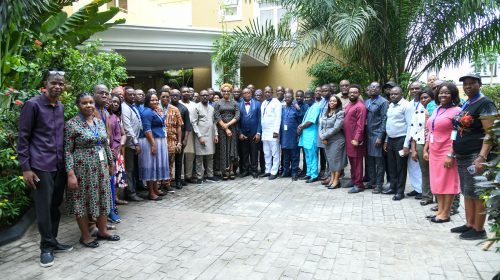Update: NAF begins investigation into accidental bombing of IDP camp
The Nigeria Air Force (NAF) has begun investigation into Tuesday’s accidental air strike at an internally displaced persons’ camp in Rann, Borno State.
It would be recalled that at least 100 persons were reported to have been killed when a NAF fighter jet involved in counter insurgency in the ongoing war against Boko Haram terrorists in the North East inadvertently fired at aid workers, soldiers and refugees at the IDP camp.
The aid workers confirmed to have been killed in the bombing included the officials of Doctors Without Borders (Medecins Sans Frontieres, MFS), International Committee of the Red Cross (ICRC) and some refugees.
The Punch quotes the NAF director of information and public relations, Group Capt. Ayodele Famuyiwa as saying: “We are saddened by today’s (Tuesday) accidental air strike by our fighter jet at Rann, in which innocent lives were lost. While available information is still sketchy, the loss occasioned by this unfortunate incident is deeply regretted.
“We commiserate with the affected families and would update the public as soon as detailed facts emerge from the investigation.”
It was learnt that the accidental air strike happened at about 9am in Rann, in the far north of Borno State as aid workers distributed food to the IDPs.
A resident of the area, Abba Abiso, told AFP on the telephone, “This morning (Tuesday), a military jet mistakenly bombarded Rann, instead of (nearby) Kala.
“In recent weeks, Boko Haram has moved base to Kala from Sambisa Forest and obviously, a military jet mistook Rann for Kala and bombarded it, killing many civilians.
“At least 25 were killed and many more injured.”
The MSF, however, said in a statement, “MSF teams have seen 120 wounded and 50 dead following the bombing.”
MSF said its teams were trying to provide emergency first aid at its facility in the camp and were stabilising patients to evacuate the wounded from the scene.
“Our medical and surgical teams in Cameroon and Chad are ready to treat wounded patients. We are in close contact with our teams, who are in shock following the event,” it added.
An official of the Borno State Government, one of those helping to coordinate the evacuation of the injured by helicopter, who spoke on condition of anonymity, said 100 people had been killed.
MSF later, on Tuesday, put the figure of the dead at 95, admitting that it had yet to confirm the figure.
The Theatre Commander of Operation Lafiya Dole, Maj. Gen. Lucky Irabor, who heads the military operation against the militants, said the Nigerian Air Force had been given coordinates of Boko Haram terrorists in the Kala-Balge area.
“This morning, we received a report about the gathering of Boko Haram terrorists around the Kala Balge area of Maiduguri,” he told reporters at a briefing in Maiduguri on Tuesday.
“I coordinated and I directed that the air component of the operation should go and address the problem.
“Unfortunately, the strike was conducted but it turned out that the locals, somewhere in Rann, were affected.
“So far, it is a little bit disturbing; death has occurred. There are casualties; there were deaths and injuries but on the actual number of casualties, we would get back to you later.
“I am yet to get the number of casualties of civilians killed, but two soldiers were also affected.
“Some humanitarian staff of MFS and some staff of ICRC were also affected.
“We are sending helicopters to evacuate those that were critically wounded, including our wounded soldiers.”
Six workers of the ICRC were among the dead, while 13 others were said to have been injured.
The Red Cross said it was “deeply concerned” about the reported casualties among civilians and humanitarian workers in the air strikes on Rann.
The ICRC spokesperson, Ms. Matijevic Aleksandra, who confirmed the casualty figure of their workers, said the injured had been moved to a medical facility in Rann.
She said, “We regret that among the casualties of today’s air strikes in Rann, there are six Nigerian Red Cross members killed and 13 injured. They brought desperately needed food for over 25,000 displaced persons.
“We have been coordinating emergency efforts in Rann with the relevant authorities and other aid actors.”
Also, the acting secretary-general, Nigerian Red Cross Headquarters, Andronicus Adeyemo, confirmed that six members of the ICRC died in the bombing.
“Six members of the Nigerian Red Cross have been confirmed dead, 14 wounded and nine are in critical conditions. That was the last count when we did staff audit.
“We hope there will be no more casualties. These are our (NRC) members, because there are other humanitarian workers on the field. I cannot talk of casualties from the IDPs, definitely, IDPs and other humanitarian workers were also affected,” he said.
“We are in contact with the relevant authorities to organise medical assistance and evacuations, and also to get more information on the situation in Rann,” said the information officer of the ICRC in Borno State, Sadiq Umar.
The head of media and publicity of the National Emergency Management Agency, Mr. Sani Datti, told one of our correspondents that the camp in question was managed by the military.
Datti said, “Let me tell you the truth, it is very difficult to get the figures because that camp is managed by the military. It is one of our satellite camps, but it is being managed by the military.
“It is only the military that can evacuate those affected from there to Maiduguri. The camp is one of the satellite camps in the liberated communities, which is why it is better for it to be managed by the military as is the case right now.”
Meanwhile, President Muhammadu Buhari, on Tuesday, said he received with deep sadness and regret the accidental bombing of a civilian community in Rann by the NAF.
In a statement by his special adviser on media and publicity, Mr. Femi Adesina, the President condoled with families of the dead.
While wishing the wounded divine succour leading to full recovery, the President also sympathised with the Borno State Government.
Buhari pledged federal help for the state government in attending to what he called “regrettable operational mistake.”






Leave a Reply